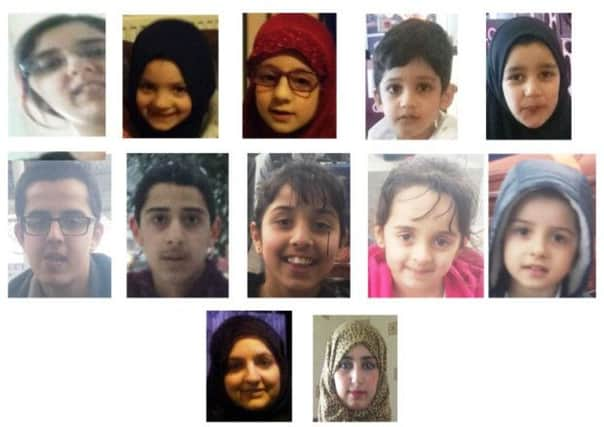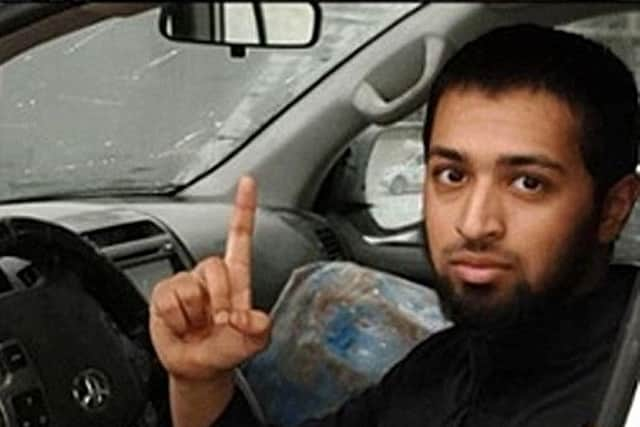Police must ‘pick up the phone’ to Turkey in bid to locate missing Bradford sisters, says MP


British sisters Khadija Dawood, 30, Sugra Dawood, 34, and Zohra Dawood, 33, and their children, aged between three and 15, are feared to have travelled to link up with terror group Islamic State (IS).
Mr Vaz, chairman of the Commons Home Affairs Committee, described it as a “terrible case” and said authorities need to stop sending emails and instead “pick up a phone” in these “life-and-death situations”.
Advertisement
Hide AdAdvertisement
Hide AdThe husbands of two of the three sisters met Mr Vaz after their lawyers said police were “complicit in the grooming and radicalising” of the women.


Last week, Akhtar Iqbal and Mohammed Shoaib broke down as they pleaded desperately for their wives to return so they could go back to their “normal lives”.
After today’s meeting in Westminster which lasted an hour and 15 minutes, Mr Vaz said: “They are clearly heartbroken.”
He said he is meeting police tomorrow to discuss the case.
“I think three things need to be done. First of all there needs to be clear lines of communication between the police and the families. They need to meet at a very senior level with the police to try and get as much information as possible - information that can be shared with the family, that isn’t operational.
Advertisement
Hide AdAdvertisement
Hide Ad“Secondly, it is very clear that we have four missing days from the family arriving in Istanbul and then crossing the border between Turkey and Syria.
“And I still think we need to sharpen up our act as far as contacting the Turkish authorities are concerned. Turkey has always been very responsive but there’s still this desire to send emails. Well, you know, you can’t.
“We are dealing now with life-and-death situations where you have to pick up a phone, a hotline, between the United Kingdom and Istanbul and tell the authorities that people are missing, get photographs to them as soon as possible, because this repeats a pattern that we’ve seen before with Bethnal Green and the three young girls there, which was not followed in Brent for the three young men because people acted very quickly, and they made phone calls instead of sending emails and therefore they were able to apprehend the three boys before they even landed in Istanbul.
“That’s the kind of urgent quick action that we need.
“And finally, I think what we also need to do is to make sure that communities realise they should be in the driving seat on these issues.
Advertisement
Hide AdAdvertisement
Hide Ad“It can’t be done by Whitehall. It’s got to be done by parents and communities. They are first and foremost responsible for watching and learning and listening to whatever is going on.
“The final point about the criticisms concerning the way in which the police have dealt with this - the allegations of radicalisation. These will need to be examined and I am meeting the police tomorrow.
“Of course they deny that this was the case. But I think this is something that needs to be cleared up between the family and police so that they’re reassured that this never happened.”
Yesterday, the men’s lawyers - Bradford-based Khan Solicitors - wrote to Mr Vaz setting out criticisms from the two men about police actions.
Advertisement
Hide AdAdvertisement
Hide AdThey said their clients are “extremely disappointed with the manner in which this matter is being investigated by West Yorkshire Police and have expressed grave concerns in the conduct of the police leading to these events”.
Referring to a brother of the sisters, who is believed to have joined IS, the letter said: “Indeed, we are alarmed by the fact that the police have been actively promoting and encouraging contact with the brother-in-law of our client whom, it is believed, is fighting in Syria.
“It would appear that there has been a reckless disregard as to the consequences of any such contact on the families of those whom we represent.”
The solicitors explained how their clients have not had the information they want about the progress of the investigation and accused the police of making sure they are not criticised for their tactic of “allowing, encouraging and promoting contact with somebody believed to be in Syria”.
Advertisement
Hide AdAdvertisement
Hide AdThe letter said: “The actions and misjudgment of the Nectu (North East Counter Terror Unit) has placed the lives of 12 British citizens at risk, nine of which are innocent children, the youngest being three years of age.”
The letter also confirmed that Zohra Dawood left a voice message for her family on Wednesday indicating she was already in Syria and that all the missing people had travelled there together “due to the oppressive nature of the continued surveillance by the police”.
It said the police released this information last week without any consultation with the fathers and that senior officers have refused to meet the two men.
The solicitors asked Mr Vaz if he could intervene.
Mr Vaz said cases like this require “instant decisions” and phone calls should be made rather than sending emails.
Advertisement
Hide AdAdvertisement
Hide Ad“We are at war with Isil now. There’s no doubt about this. This is a battle for the hearts and minds of British citizens and we need to pick up phones and make instant decisions and pass on information quickly,” he said.
Asked if police missed opportunities in this case, Mr Vaz said: “It’s the system. It’s not one particular agency. The system isn’t robust enough.
“And I know from my visit to Istanbul only last weekend that the security from the police and the border force has increased hugely since I last looked at this.
“But I do think that we need to make sure our consulate is opened up for all hours and somebody needs to be there to take these calls.
Advertisement
Hide AdAdvertisement
Hide Ad“It’s not an excuse to tell people that it’s a weekend. We are really in a real battle here and we need to be absolutely firm in dealing with it.”
Earlier today, it emerged that a new police unit is being set up across Europe to uncover and block social media accounts being used by Islamic State (IS).
The European police agency Europol will target the estimated 40,000 to 50,000 accounts linked to the terrorist organisation.
Working with unnamed social media companies, it aims to shut down the accounts within two hours of them being discovered.
Advertisement
Hide AdAdvertisement
Hide AdCalls for more to be done to tackle online radicalisation have mounted in recent weeks after claims that Talha Asmal, who was reported to have become Britain’s youngest suicide bomber, was groomed over the internet.
Talha, 17, is alleged to have fled his home in Dewsbury, West Yorkshire, in March to join IS and reportedly detonated a vehicle while fighting for the group in Iraq.
His family said he had been exploited by extremists on the internet “in a process of deliberate and calculated grooming”.
Rob Wainwright, Europol’s director, said the new unit, which comes into force on July 1, would work to identify the key accounts being run in a number of languages that “underpin” what IS is doing and would aim to “identify the ringleaders online”.
Advertisement
Hide AdAdvertisement
Hide AdHe told the Guardian it would also monitor social media to identify any activity targeting people who might be vulnerable, as well as those preying on them.
He said: “Who is it reaching out to young people, in particular, by social media, to get them to come, in the first place? It’s very difficult because of the dynamic nature of social media.”
Mr Wainwright added that money used to fund IS would be tracked down, saying: “Where you follow the money trail, it helps find who they are, what they are doing and who their associates are.”
Europol believes up to 5,000 people from the EU, including those from the UK, France, Belgium and the Netherlands, have travelled to IS-held areas. Around 700 Britons are thought to have travelled to IS-controlled regions of Syria and Iraq.
Advertisement
Hide AdAdvertisement
Hide AdThe former reviewer of anti-terrorism legislation, Lord Carlile, has called on the Government to work with computer programmers and social media companies to counter extremist propaganda online.
Mr Wainwright said that IS had proved to be “very technologically adept” and had exploited the internet and social media in a much bigger way than other terrorist organisations had in the past.
“We will have to combine what we see online with our own intelligence that is shared with us by European police services so, therefore, we can be a bit more targeted, identifying who the key user accounts are and concentrating on closing them down and then pursuing the more conventional counter-terrorism investigation around them,” he told the BBC Radio 4 Today programme.
“So in the end what we are hoping to have is strategic impact against the problem as a whole rather than just playing a simple numbers game.”